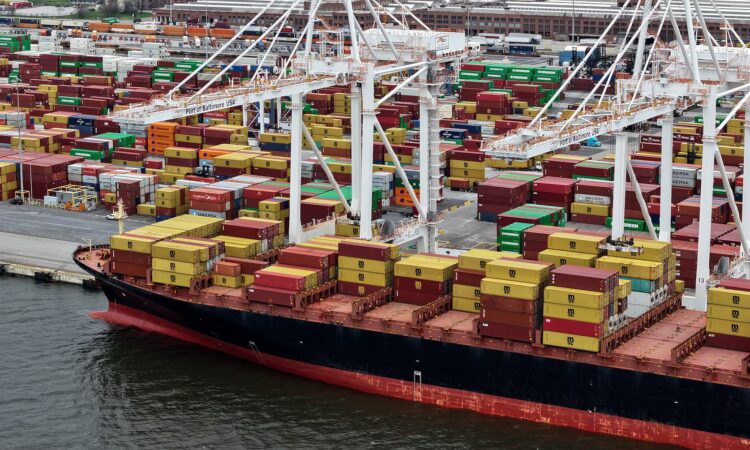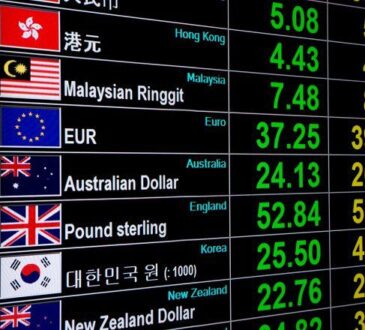
Item 1 of 2 A drone view shows containers on a ship on the day U.S. President Donald Trump is set to announce new tariffs, at the Port of Baltimore, Maryland, U.S., April 2, 2025. REUTERS/Evelyn Hockstein
WASHINGTON, Oct 14 (Reuters) – Global markets are too comfortable with risks, including trade wars, geopolitical tensions and yawning government deficits, which, combined with already overpriced assets, increase the chance of a “disorderly” market correction, the International Monetary Fund said on Tuesday.
Sign up here.
“Beneath the calm surface, the ground is shifting in several parts of the financial system, giving rise to vulnerabilities,” the global lender wrote in its semi-annual Global Financial Stability Report.
“Valuation models indicate that risk asset prices are well above fundamentals, increasing the probability of disorderly corrections when adverse shocks occur,” it wrote.
Despite some negative economic data, equity and corporate credit valuations are “fairly stretched” as enthusiasm over AI mega-cap stocks drives historic stock market concentration. That creates the risk of a “sudden, sharp correction” if expected returns fail to justify lofty valuations, the IMF said.

ASSET PRICES SIGNAL DANGEROUS BUBBLE TERRITORY
Analysis of sovereign bond markets also highlights growing pressure from widening fiscal deficits on market functioning. While bond markets have been mostly stable so far, abrupt jumps in yields could strain bank balance sheets and pressure open-ended funds like mutual funds, the IMF said.
Speaking to reporters in Washington on Tuesday, Tobias Adrian, director of the IMF’s monetary and capital markets department, warned that term premium – the risk premium investors demand for holding longer-term bonds rather than rolling over short-term debt – is now at levels not seen since before 2009. It may continue to rise as supply increases, he said.
“While financial conditions are easy, the macro financial risks remain,” said Adrian.
The IMF said central banks should remain alert to tariff-driven inflation risks and take a cautious stance on monetary easing to minimize further valuation spikes in riskier assets. Central bank independence is “critical” for anchoring market expectations and allowing those institutions to fulfill their mandates, it added, without referring to a specific institution.
The IMF also called for “urgent fiscal adjustments” to curb deficits and ensure resilient bond markets.
NONBANK FINANCIAL FIRMS CREATE CONTAGION RISK
Heightened interconnectedness between banks and the more lightly regulated nonbank sector would amplify any shocks stemming from sectors such as private credit or cryptocurrencies, the IMF said.
The group for years warned about patchy nonbank oversight but cautioned on Tuesday that the sector – which includes insurers, pension funds and hedge funds – continues to grow and now holds roughly half of the world’s financial assets. In the U.S. and Europe, many banks have nonbank exposures that exceed their high-quality loss-absorbing capital, the IMF said.
Roughly 10% of U.S. banks and 30% of European banks would experience a substantial hit to their capital if nonbanks drew down all their credit lines, according to an IMF analysis.
“Vulnerabilities in the nonbank sector are interconnected,” the IMF wrote. “They can quickly transmit to the core banking system, amplifying shocks and complicating crisis management.”
The global lender urged policymakers to adopt a more comprehensive approach to assessing these less visible risks, particularly around interactions between banks and nonbanks.
Reporting by Pete Schroeder; additional reporting by Elisa Martinuzzi in Washington; Editing by Michelle Price, Lisa Shumaker and Paul Simao
Our Standards: The Thomson Reuters Trust Principles.





